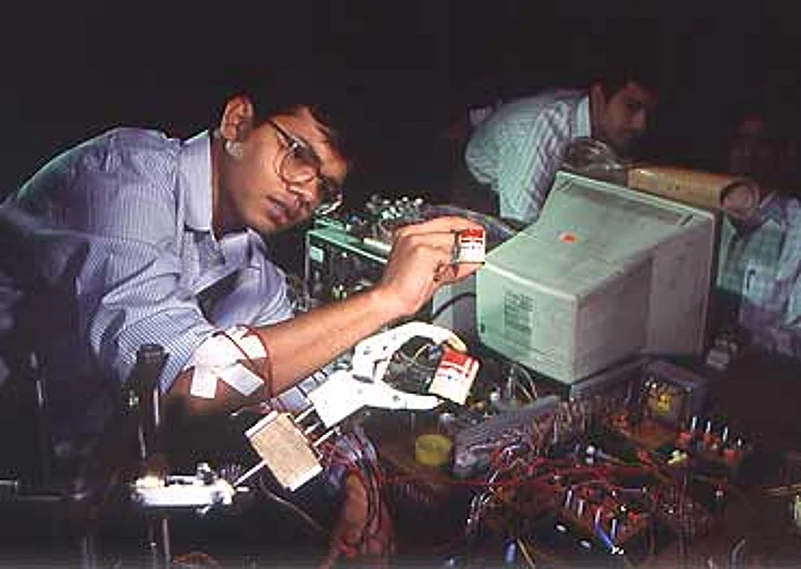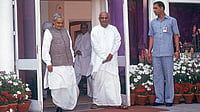Not So Bright
- Tata Steel MD, B. Muthuraman, an IIT Madras graduate, says IITs are now thriving on their "past reputation" and TISCO is "not likely to recruit" IIT graduates any longer
- Many IIT professors too find the present crop of students lacking in creativity, and the spirit of innovation and inquiry
- They blame the students' blinkered, robotic approach to their studies on the fact that a large majority are products of coaching factories.
- They call for reform of the joint engineering exam (JEE), and of the IIT curriculum as well, to develop the students' societal awareness, communication skills and knowledge of the humanities.
***

When the inputs for getting into IITs is itself flawed, how could one expect the finished product to be a bright spark? "One cannot get a diamond out of clay or ordinary stone, however much it is polished," says Prof M.R. Madhav. In a mail exchange, a IIT-Madras professor admitted: "One thing my colleagues and I seem to agree is about the damage that the gruesome entrance exam causes to the motivation of a student to study seriously after entering the campus. Having seen fellow students decades ago and my students now, I should say there is a deterioration." An IIT review report of 2004 commissioned by the government with eminent scientists on board too took a critical view of the JEE and made this recommendation: "The level of examination should be made suitable for what can reasonably be expected of a bright school-leaving child without need for intensive coaching outside of what the school curricula prescribe. The purpose is to screen inherently gifted candidates capable of thinking on their own." Pointing out the limitations of the IIT curriculum, the report says that "several employers have observed that the communication skills and societal awareness of B.Tech graduates are not commensurate with their technical skills.... Ignoring the importance of Social Science and Humanities education can place at risk technical leadership that is gaining prominence, within our own country and on the world stage".
Statistics secured from a dean of students of an IIT offer an insight to the admission imbalance at the premier institutes. For a recent year under review, 979 candidates from the South zone secured admission. Of them 769 were from Andhra Pradesh alone, Tamil Nadu had 94, Karnataka 84 and Kerala a mere 32. "Andhra may well be producing bright IIT entrants, but those from other three states can't be that poor. Mushrooming ofIIT tutorials and coaching centres in Hyderabad may have to do with the JEE results," says Bhamy Shenoy. In the North zone, Rajasthan is the unlikely state that is reported to have been sending a high proportion of students to IITs, and this is due to the umpteen coaching centres in Kota: "The amount spent by IIT aspirants attending the coaching factories is estimated to be around Rs 2,000 crore, which is four times the annual budgetary allocation of the government for the IITs," observes Shenoy.
Gururaj 'Desh' Deshpande, co-founder of Sycamore Networks and IIT Madras alumnus, has a different take on the issue—he doesn't agree that standards have fallen at IITs. He says the amount spent on coaching certainly demonstrates that we are not putting our resources to good use. "We spend more resources getting students into the IITs rather than building more IITs. But the good news is that we have so many motivated students who are prepared to work so hard to get into IITs. The solution here is to open up the market for education."
Like Desh, many other honchos of corporate India that Outlook spoke to were also circumspect in their comments on the current crop of IITians, though their remarks imply that they no longer find the best talent there. Vidya Natampally, director-strategy at Microsoft Research, says guardedly: "We recruit creative people with a strong research vision, irrespective of the institution that they have studied in." A blogger had an interesting point about IITians and Microsoft: "In April 2007, there were just seven Indians out of 118 Microsoft executives and only three of them are IITians. Why are there so few IITians in the top pack of the software giant?" Bikramjit Maitra, head of HR at Infosys, said that though "IIT graduates represent a pool of talent that has been hand-picked by the JEE exam and honed by academic rigours...there exist several such talent pools in India." The sentiments expressed are clearly not quite the unqualified praise that should have been there for the recent crop of IITians. Perhaps it's time the IITs paid serious heed to the warnings of Muthuraman and others who share his views.
/p>


























